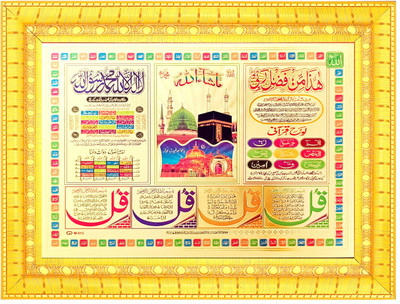BCOMFORT Kaba Madina Mashaallah Ayatul Qursi Loh Qurani 4 Qul 9x7 In Religious Frame
Quick Overview
Product Price Comparison
he Kaaba (also spelled as "Kaba" or "Ka'bah") is a sacred and iconic structure located within the Masjid al-Haram (the Grand Mosque) in Mecca, Saudi Arabia. It is considered the most sacred site in Islam and plays a central role in the Hajj pilgrimage and daily Islamic prayers (Salat).Medina (also spelled as Madinah or Al-Madinah al-Munawwarah) is one of the two holiest cities in Islam, the other being Mecca. It is located in modern-day Saudi Arabia and holds great religious and historical significance for Muslims around the world."MashaAllah" (?? ??? ????) is an Arabic phrase commonly used by Muslims, particularly in Islamic cultures, to express appreciation, admiration, or awe for something that is good or impressive. It is often used to acknowledge and praise God's will and blessings.The Arabic phrase "?????? ??? ?????? ??????" (Haza min fadli rabbi) translates to "This is from the bounty of my Lord" in English. This phrase is often used by Muslims to express gratitude and acknowledgment that any good or blessing they have received is a result of God's grace and bounty.The term "Loh Qurani" refers to a written or inscribed representation of a Quranic verse or verses. "Loh" is an Urdu word that can be translated as "slab" or "tablet," and it is often used to describe a flat, inscribed surface. In the context of Islamic calligraphy and religious art, a "Loh Qurani" typically refers to a decorative or artistic representation of a specific Quranic verse or verses that are displayed prominently, often as a form of religious decoration or as a means of seeking blessings and protection.The "Four Qul" (also spelled as "4 Qul" or "Four Quls") refer to four short chapters (surahs) from the Quran, each of which begins with the Arabic word "Qul" (???), which means "say." These chapters are often recited by Muslims for protection and blessings.In Islam, there are 99 names or attributes of Allah, known as the "99 Names of Allah" or the "Asmaul Husna." These names describe various qualities and attributes of Allah, emphasizing His greatness, mercy, and power. Reciting these names and contemplating their meanings is a way for Muslims to praise and understand God better.


